Critical Analysis: Ethics and Professionalism in Criminal Justice
VerifiedAdded on 2023/04/25
|6
|1785
|125
Essay
AI Summary
This essay critically analyzes the relationship between ethics and professional behavior in the administration of criminal justice, emphasizing the importance of ethical conduct for law enforcement officers. It explores how ethical principles shape behavior and influence interactions with the public, highlighting the role of ethics in maintaining public trust and ensuring justice. The essay discusses the significance of critical thinking in navigating ethical dilemmas and proposes a seminar for ethical training, focusing on key areas such as maintaining peace, upholding laws in personal life, enforcing laws fairly, adhering to ethical standards, and promoting honesty. The analysis concludes that a strong connection between ethics and professional behavior is crucial for law enforcement to effectively serve communities and uphold justice.

0 | P a g e
Criminal Law
Criminal Law
Paraphrase This Document
Need a fresh take? Get an instant paraphrase of this document with our AI Paraphraser
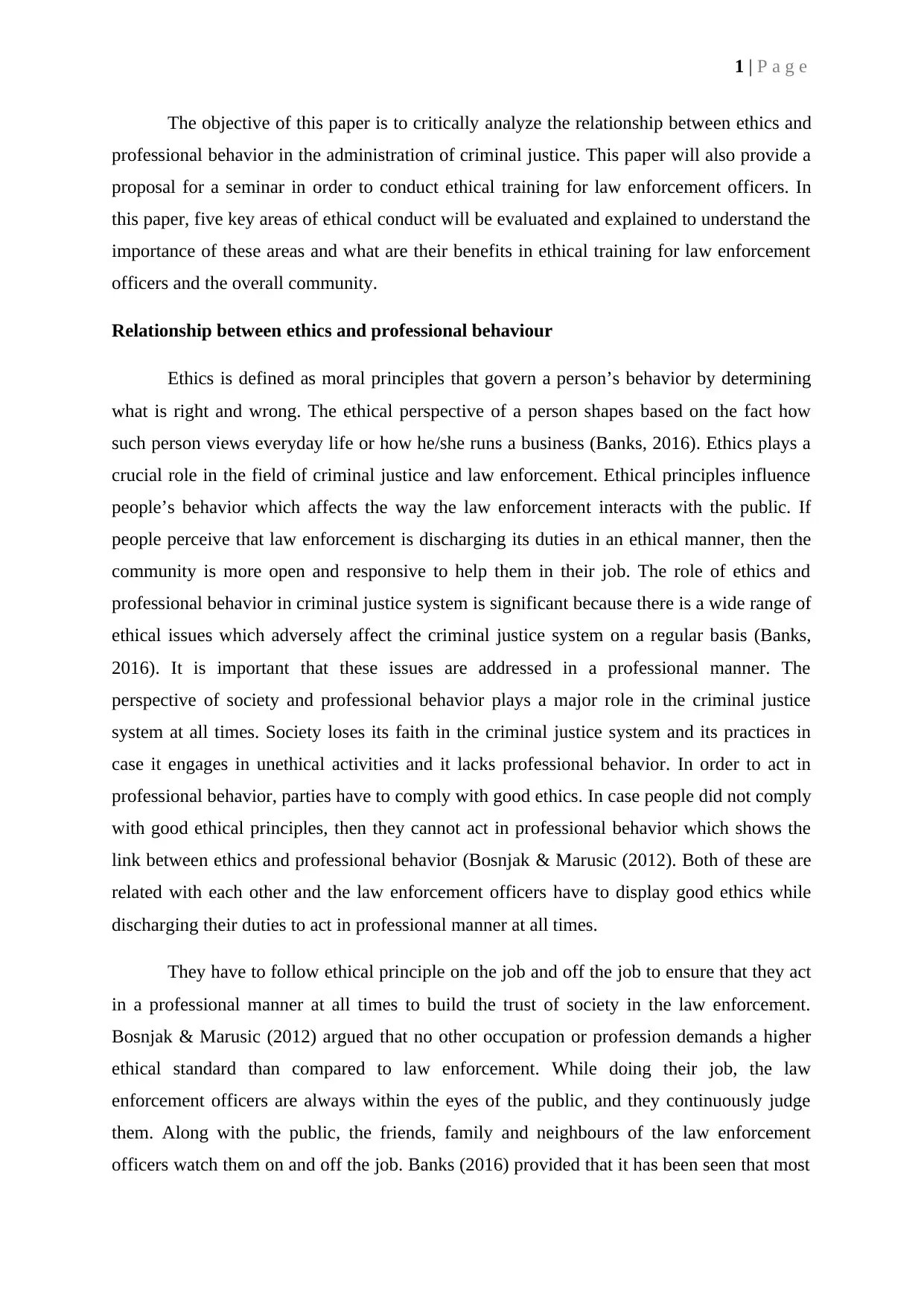
1 | P a g e
The objective of this paper is to critically analyze the relationship between ethics and
professional behavior in the administration of criminal justice. This paper will also provide a
proposal for a seminar in order to conduct ethical training for law enforcement officers. In
this paper, five key areas of ethical conduct will be evaluated and explained to understand the
importance of these areas and what are their benefits in ethical training for law enforcement
officers and the overall community.
Relationship between ethics and professional behaviour
Ethics is defined as moral principles that govern a person’s behavior by determining
what is right and wrong. The ethical perspective of a person shapes based on the fact how
such person views everyday life or how he/she runs a business (Banks, 2016). Ethics plays a
crucial role in the field of criminal justice and law enforcement. Ethical principles influence
people’s behavior which affects the way the law enforcement interacts with the public. If
people perceive that law enforcement is discharging its duties in an ethical manner, then the
community is more open and responsive to help them in their job. The role of ethics and
professional behavior in criminal justice system is significant because there is a wide range of
ethical issues which adversely affect the criminal justice system on a regular basis (Banks,
2016). It is important that these issues are addressed in a professional manner. The
perspective of society and professional behavior plays a major role in the criminal justice
system at all times. Society loses its faith in the criminal justice system and its practices in
case it engages in unethical activities and it lacks professional behavior. In order to act in
professional behavior, parties have to comply with good ethics. In case people did not comply
with good ethical principles, then they cannot act in professional behavior which shows the
link between ethics and professional behavior (Bosnjak & Marusic (2012). Both of these are
related with each other and the law enforcement officers have to display good ethics while
discharging their duties to act in professional manner at all times.
They have to follow ethical principle on the job and off the job to ensure that they act
in a professional manner at all times to build the trust of society in the law enforcement.
Bosnjak & Marusic (2012) argued that no other occupation or profession demands a higher
ethical standard than compared to law enforcement. While doing their job, the law
enforcement officers are always within the eyes of the public, and they continuously judge
them. Along with the public, the friends, family and neighbours of the law enforcement
officers watch them on and off the job. Banks (2016) provided that it has been seen that most
The objective of this paper is to critically analyze the relationship between ethics and
professional behavior in the administration of criminal justice. This paper will also provide a
proposal for a seminar in order to conduct ethical training for law enforcement officers. In
this paper, five key areas of ethical conduct will be evaluated and explained to understand the
importance of these areas and what are their benefits in ethical training for law enforcement
officers and the overall community.
Relationship between ethics and professional behaviour
Ethics is defined as moral principles that govern a person’s behavior by determining
what is right and wrong. The ethical perspective of a person shapes based on the fact how
such person views everyday life or how he/she runs a business (Banks, 2016). Ethics plays a
crucial role in the field of criminal justice and law enforcement. Ethical principles influence
people’s behavior which affects the way the law enforcement interacts with the public. If
people perceive that law enforcement is discharging its duties in an ethical manner, then the
community is more open and responsive to help them in their job. The role of ethics and
professional behavior in criminal justice system is significant because there is a wide range of
ethical issues which adversely affect the criminal justice system on a regular basis (Banks,
2016). It is important that these issues are addressed in a professional manner. The
perspective of society and professional behavior plays a major role in the criminal justice
system at all times. Society loses its faith in the criminal justice system and its practices in
case it engages in unethical activities and it lacks professional behavior. In order to act in
professional behavior, parties have to comply with good ethics. In case people did not comply
with good ethical principles, then they cannot act in professional behavior which shows the
link between ethics and professional behavior (Bosnjak & Marusic (2012). Both of these are
related with each other and the law enforcement officers have to display good ethics while
discharging their duties to act in professional manner at all times.
They have to follow ethical principle on the job and off the job to ensure that they act
in a professional manner at all times to build the trust of society in the law enforcement.
Bosnjak & Marusic (2012) argued that no other occupation or profession demands a higher
ethical standard than compared to law enforcement. While doing their job, the law
enforcement officers are always within the eyes of the public, and they continuously judge
them. Along with the public, the friends, family and neighbours of the law enforcement
officers watch them on and off the job. Banks (2016) provided that it has been seen that most
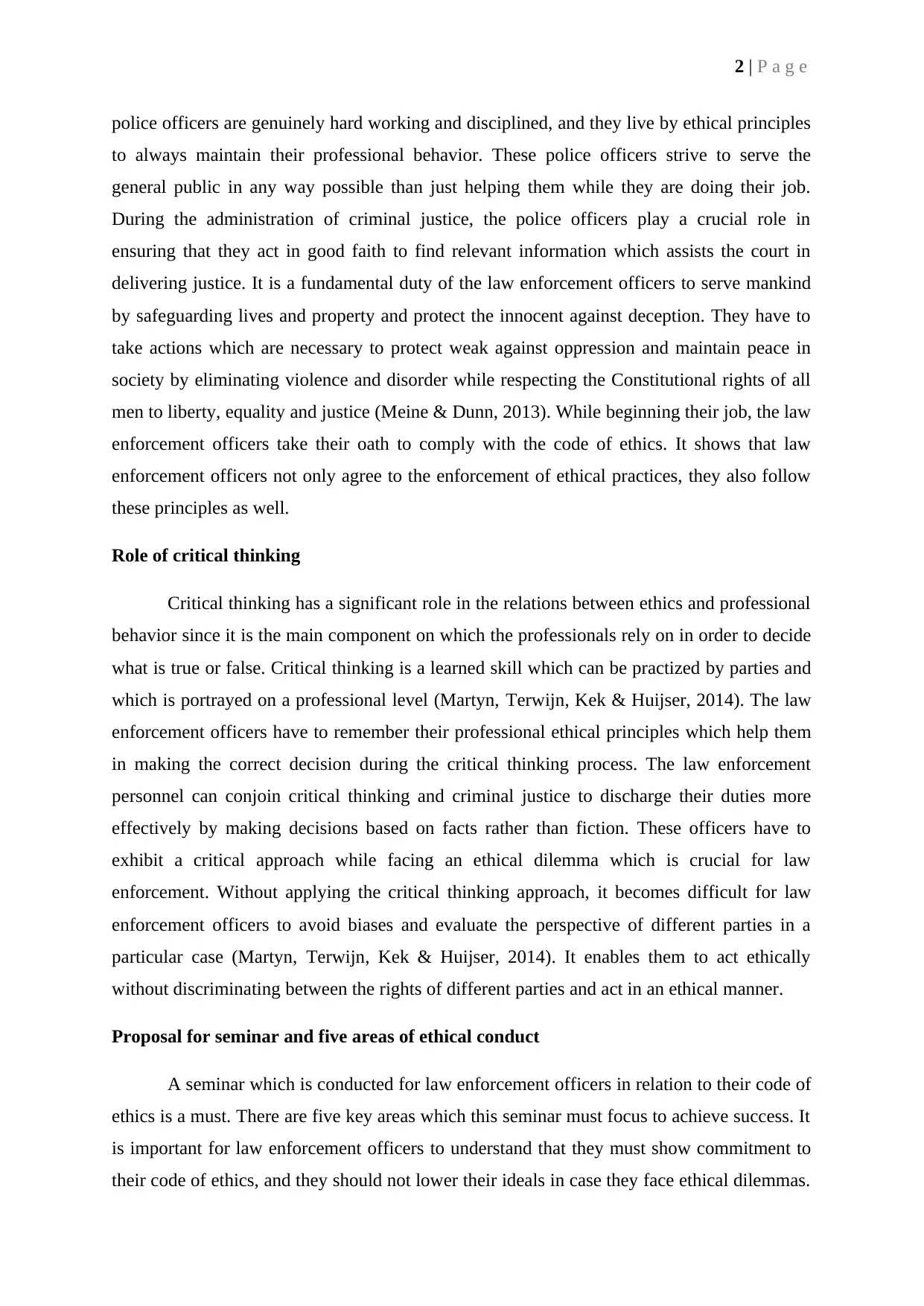
2 | P a g e
police officers are genuinely hard working and disciplined, and they live by ethical principles
to always maintain their professional behavior. These police officers strive to serve the
general public in any way possible than just helping them while they are doing their job.
During the administration of criminal justice, the police officers play a crucial role in
ensuring that they act in good faith to find relevant information which assists the court in
delivering justice. It is a fundamental duty of the law enforcement officers to serve mankind
by safeguarding lives and property and protect the innocent against deception. They have to
take actions which are necessary to protect weak against oppression and maintain peace in
society by eliminating violence and disorder while respecting the Constitutional rights of all
men to liberty, equality and justice (Meine & Dunn, 2013). While beginning their job, the law
enforcement officers take their oath to comply with the code of ethics. It shows that law
enforcement officers not only agree to the enforcement of ethical practices, they also follow
these principles as well.
Role of critical thinking
Critical thinking has a significant role in the relations between ethics and professional
behavior since it is the main component on which the professionals rely on in order to decide
what is true or false. Critical thinking is a learned skill which can be practized by parties and
which is portrayed on a professional level (Martyn, Terwijn, Kek & Huijser, 2014). The law
enforcement officers have to remember their professional ethical principles which help them
in making the correct decision during the critical thinking process. The law enforcement
personnel can conjoin critical thinking and criminal justice to discharge their duties more
effectively by making decisions based on facts rather than fiction. These officers have to
exhibit a critical approach while facing an ethical dilemma which is crucial for law
enforcement. Without applying the critical thinking approach, it becomes difficult for law
enforcement officers to avoid biases and evaluate the perspective of different parties in a
particular case (Martyn, Terwijn, Kek & Huijser, 2014). It enables them to act ethically
without discriminating between the rights of different parties and act in an ethical manner.
Proposal for seminar and five areas of ethical conduct
A seminar which is conducted for law enforcement officers in relation to their code of
ethics is a must. There are five key areas which this seminar must focus to achieve success. It
is important for law enforcement officers to understand that they must show commitment to
their code of ethics, and they should not lower their ideals in case they face ethical dilemmas.
police officers are genuinely hard working and disciplined, and they live by ethical principles
to always maintain their professional behavior. These police officers strive to serve the
general public in any way possible than just helping them while they are doing their job.
During the administration of criminal justice, the police officers play a crucial role in
ensuring that they act in good faith to find relevant information which assists the court in
delivering justice. It is a fundamental duty of the law enforcement officers to serve mankind
by safeguarding lives and property and protect the innocent against deception. They have to
take actions which are necessary to protect weak against oppression and maintain peace in
society by eliminating violence and disorder while respecting the Constitutional rights of all
men to liberty, equality and justice (Meine & Dunn, 2013). While beginning their job, the law
enforcement officers take their oath to comply with the code of ethics. It shows that law
enforcement officers not only agree to the enforcement of ethical practices, they also follow
these principles as well.
Role of critical thinking
Critical thinking has a significant role in the relations between ethics and professional
behavior since it is the main component on which the professionals rely on in order to decide
what is true or false. Critical thinking is a learned skill which can be practized by parties and
which is portrayed on a professional level (Martyn, Terwijn, Kek & Huijser, 2014). The law
enforcement officers have to remember their professional ethical principles which help them
in making the correct decision during the critical thinking process. The law enforcement
personnel can conjoin critical thinking and criminal justice to discharge their duties more
effectively by making decisions based on facts rather than fiction. These officers have to
exhibit a critical approach while facing an ethical dilemma which is crucial for law
enforcement. Without applying the critical thinking approach, it becomes difficult for law
enforcement officers to avoid biases and evaluate the perspective of different parties in a
particular case (Martyn, Terwijn, Kek & Huijser, 2014). It enables them to act ethically
without discriminating between the rights of different parties and act in an ethical manner.
Proposal for seminar and five areas of ethical conduct
A seminar which is conducted for law enforcement officers in relation to their code of
ethics is a must. There are five key areas which this seminar must focus to achieve success. It
is important for law enforcement officers to understand that they must show commitment to
their code of ethics, and they should not lower their ideals in case they face ethical dilemmas.
⊘ This is a preview!⊘
Do you want full access?
Subscribe today to unlock all pages.

Trusted by 1+ million students worldwide
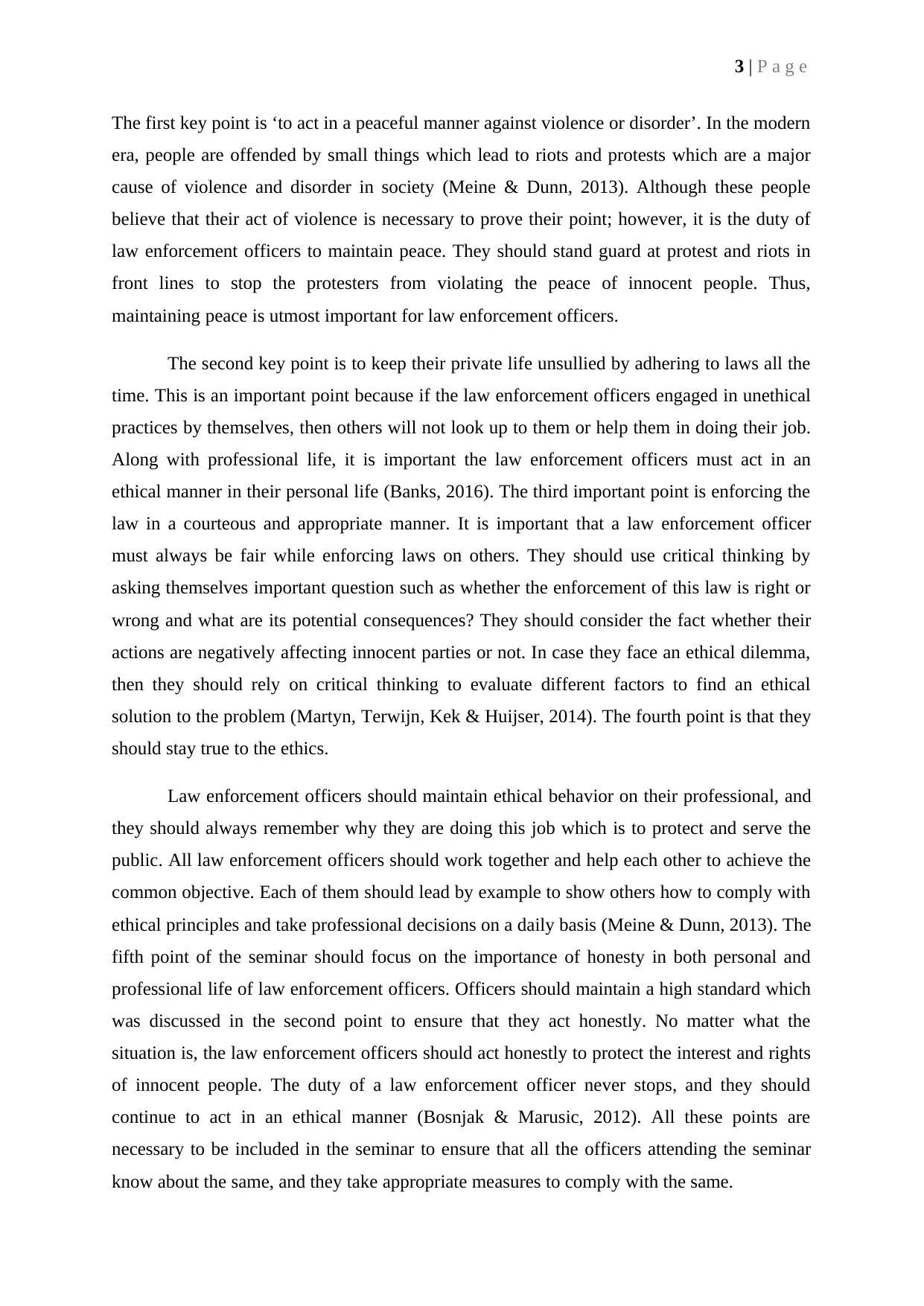
3 | P a g e
The first key point is ‘to act in a peaceful manner against violence or disorder’. In the modern
era, people are offended by small things which lead to riots and protests which are a major
cause of violence and disorder in society (Meine & Dunn, 2013). Although these people
believe that their act of violence is necessary to prove their point; however, it is the duty of
law enforcement officers to maintain peace. They should stand guard at protest and riots in
front lines to stop the protesters from violating the peace of innocent people. Thus,
maintaining peace is utmost important for law enforcement officers.
The second key point is to keep their private life unsullied by adhering to laws all the
time. This is an important point because if the law enforcement officers engaged in unethical
practices by themselves, then others will not look up to them or help them in doing their job.
Along with professional life, it is important the law enforcement officers must act in an
ethical manner in their personal life (Banks, 2016). The third important point is enforcing the
law in a courteous and appropriate manner. It is important that a law enforcement officer
must always be fair while enforcing laws on others. They should use critical thinking by
asking themselves important question such as whether the enforcement of this law is right or
wrong and what are its potential consequences? They should consider the fact whether their
actions are negatively affecting innocent parties or not. In case they face an ethical dilemma,
then they should rely on critical thinking to evaluate different factors to find an ethical
solution to the problem (Martyn, Terwijn, Kek & Huijser, 2014). The fourth point is that they
should stay true to the ethics.
Law enforcement officers should maintain ethical behavior on their professional, and
they should always remember why they are doing this job which is to protect and serve the
public. All law enforcement officers should work together and help each other to achieve the
common objective. Each of them should lead by example to show others how to comply with
ethical principles and take professional decisions on a daily basis (Meine & Dunn, 2013). The
fifth point of the seminar should focus on the importance of honesty in both personal and
professional life of law enforcement officers. Officers should maintain a high standard which
was discussed in the second point to ensure that they act honestly. No matter what the
situation is, the law enforcement officers should act honestly to protect the interest and rights
of innocent people. The duty of a law enforcement officer never stops, and they should
continue to act in an ethical manner (Bosnjak & Marusic, 2012). All these points are
necessary to be included in the seminar to ensure that all the officers attending the seminar
know about the same, and they take appropriate measures to comply with the same.
The first key point is ‘to act in a peaceful manner against violence or disorder’. In the modern
era, people are offended by small things which lead to riots and protests which are a major
cause of violence and disorder in society (Meine & Dunn, 2013). Although these people
believe that their act of violence is necessary to prove their point; however, it is the duty of
law enforcement officers to maintain peace. They should stand guard at protest and riots in
front lines to stop the protesters from violating the peace of innocent people. Thus,
maintaining peace is utmost important for law enforcement officers.
The second key point is to keep their private life unsullied by adhering to laws all the
time. This is an important point because if the law enforcement officers engaged in unethical
practices by themselves, then others will not look up to them or help them in doing their job.
Along with professional life, it is important the law enforcement officers must act in an
ethical manner in their personal life (Banks, 2016). The third important point is enforcing the
law in a courteous and appropriate manner. It is important that a law enforcement officer
must always be fair while enforcing laws on others. They should use critical thinking by
asking themselves important question such as whether the enforcement of this law is right or
wrong and what are its potential consequences? They should consider the fact whether their
actions are negatively affecting innocent parties or not. In case they face an ethical dilemma,
then they should rely on critical thinking to evaluate different factors to find an ethical
solution to the problem (Martyn, Terwijn, Kek & Huijser, 2014). The fourth point is that they
should stay true to the ethics.
Law enforcement officers should maintain ethical behavior on their professional, and
they should always remember why they are doing this job which is to protect and serve the
public. All law enforcement officers should work together and help each other to achieve the
common objective. Each of them should lead by example to show others how to comply with
ethical principles and take professional decisions on a daily basis (Meine & Dunn, 2013). The
fifth point of the seminar should focus on the importance of honesty in both personal and
professional life of law enforcement officers. Officers should maintain a high standard which
was discussed in the second point to ensure that they act honestly. No matter what the
situation is, the law enforcement officers should act honestly to protect the interest and rights
of innocent people. The duty of a law enforcement officer never stops, and they should
continue to act in an ethical manner (Bosnjak & Marusic, 2012). All these points are
necessary to be included in the seminar to ensure that all the officers attending the seminar
know about the same, and they take appropriate measures to comply with the same.
Paraphrase This Document
Need a fresh take? Get an instant paraphrase of this document with our AI Paraphraser
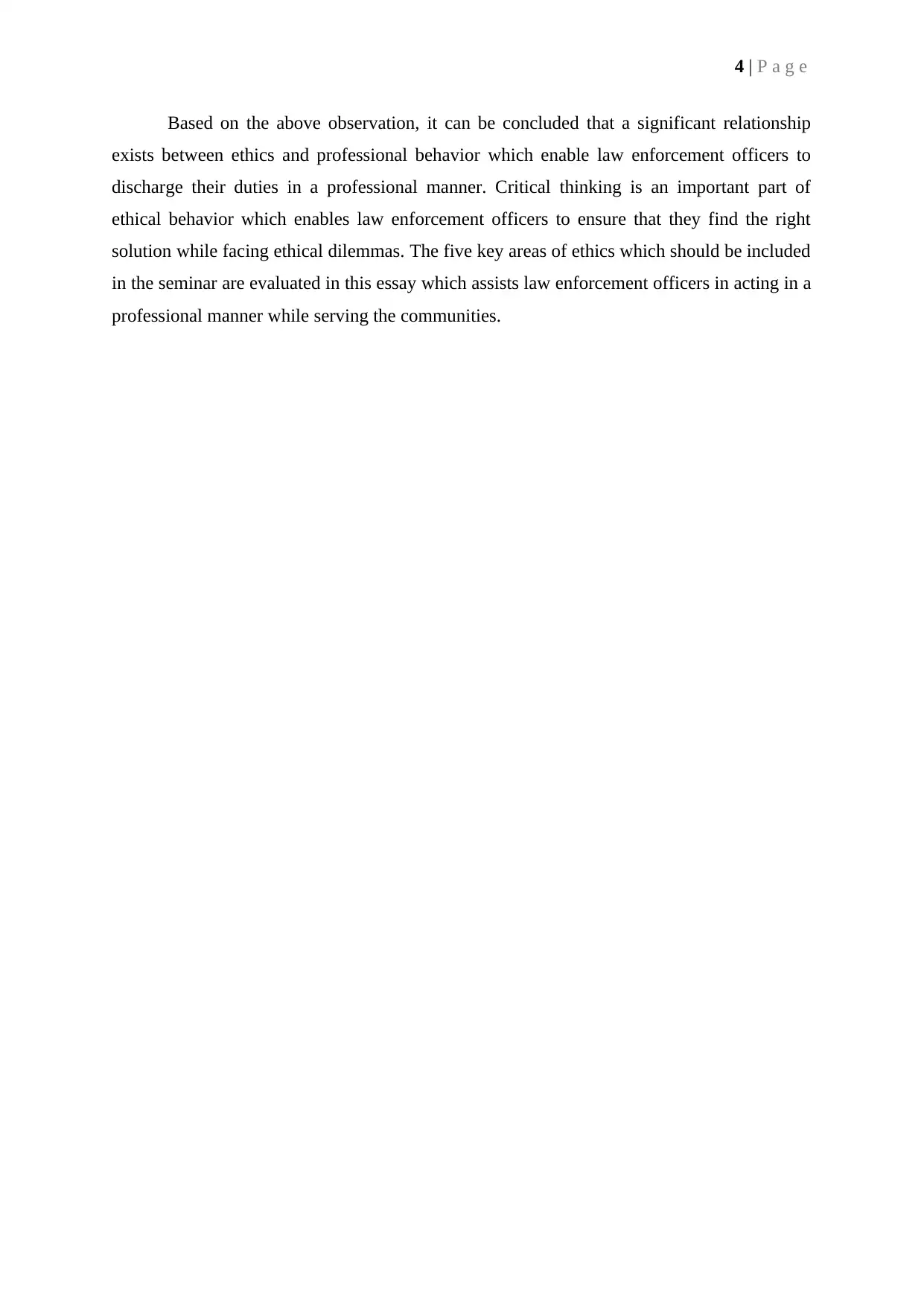
4 | P a g e
Based on the above observation, it can be concluded that a significant relationship
exists between ethics and professional behavior which enable law enforcement officers to
discharge their duties in a professional manner. Critical thinking is an important part of
ethical behavior which enables law enforcement officers to ensure that they find the right
solution while facing ethical dilemmas. The five key areas of ethics which should be included
in the seminar are evaluated in this essay which assists law enforcement officers in acting in a
professional manner while serving the communities.
Based on the above observation, it can be concluded that a significant relationship
exists between ethics and professional behavior which enable law enforcement officers to
discharge their duties in a professional manner. Critical thinking is an important part of
ethical behavior which enables law enforcement officers to ensure that they find the right
solution while facing ethical dilemmas. The five key areas of ethics which should be included
in the seminar are evaluated in this essay which assists law enforcement officers in acting in a
professional manner while serving the communities.
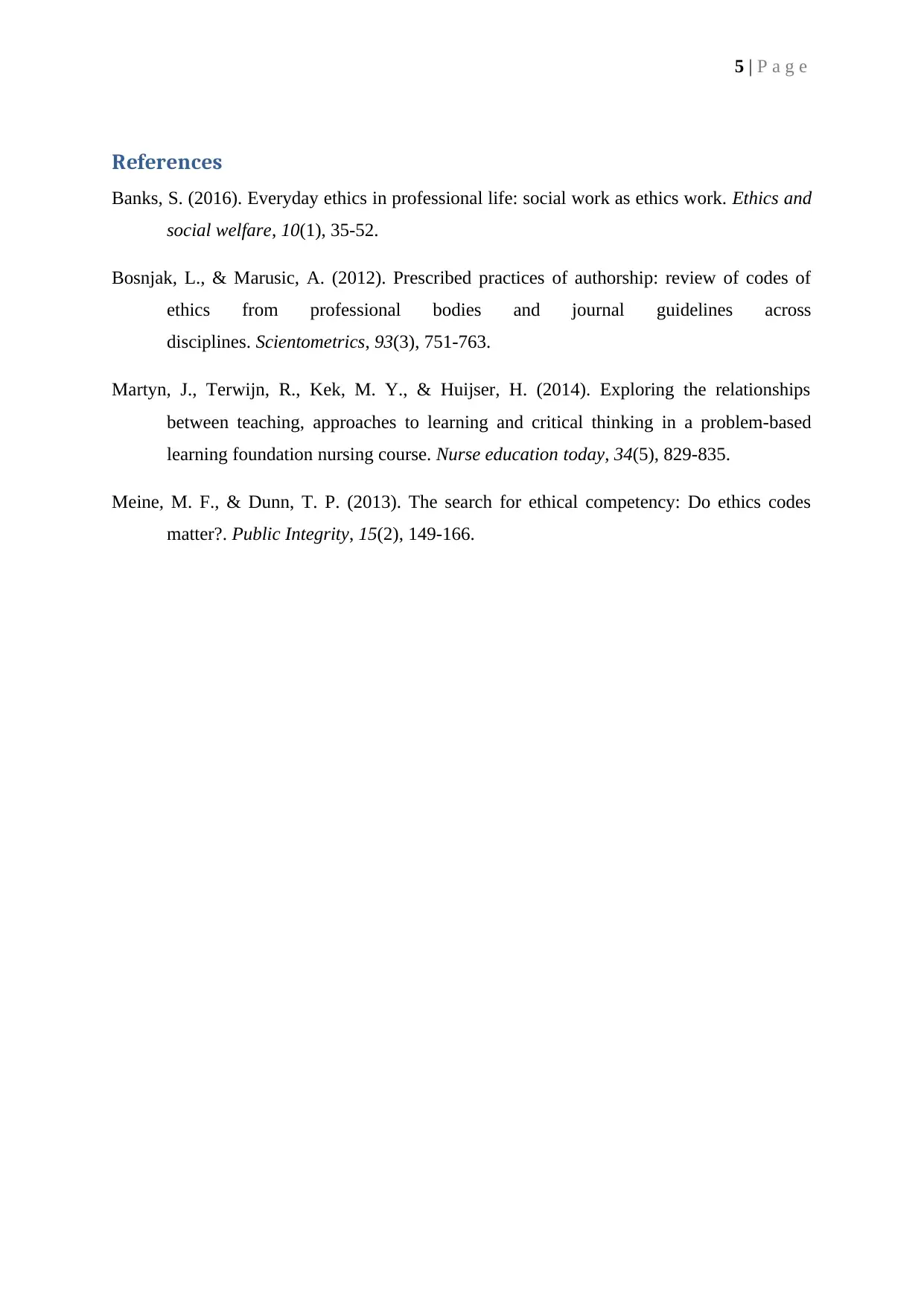
5 | P a g e
References
Banks, S. (2016). Everyday ethics in professional life: social work as ethics work. Ethics and
social welfare, 10(1), 35-52.
Bosnjak, L., & Marusic, A. (2012). Prescribed practices of authorship: review of codes of
ethics from professional bodies and journal guidelines across
disciplines. Scientometrics, 93(3), 751-763.
Martyn, J., Terwijn, R., Kek, M. Y., & Huijser, H. (2014). Exploring the relationships
between teaching, approaches to learning and critical thinking in a problem-based
learning foundation nursing course. Nurse education today, 34(5), 829-835.
Meine, M. F., & Dunn, T. P. (2013). The search for ethical competency: Do ethics codes
matter?. Public Integrity, 15(2), 149-166.
References
Banks, S. (2016). Everyday ethics in professional life: social work as ethics work. Ethics and
social welfare, 10(1), 35-52.
Bosnjak, L., & Marusic, A. (2012). Prescribed practices of authorship: review of codes of
ethics from professional bodies and journal guidelines across
disciplines. Scientometrics, 93(3), 751-763.
Martyn, J., Terwijn, R., Kek, M. Y., & Huijser, H. (2014). Exploring the relationships
between teaching, approaches to learning and critical thinking in a problem-based
learning foundation nursing course. Nurse education today, 34(5), 829-835.
Meine, M. F., & Dunn, T. P. (2013). The search for ethical competency: Do ethics codes
matter?. Public Integrity, 15(2), 149-166.
⊘ This is a preview!⊘
Do you want full access?
Subscribe today to unlock all pages.

Trusted by 1+ million students worldwide
1 out of 6
Related Documents
Your All-in-One AI-Powered Toolkit for Academic Success.
+13062052269
info@desklib.com
Available 24*7 on WhatsApp / Email
![[object Object]](/_next/static/media/star-bottom.7253800d.svg)
Unlock your academic potential
Copyright © 2020–2026 A2Z Services. All Rights Reserved. Developed and managed by ZUCOL.





